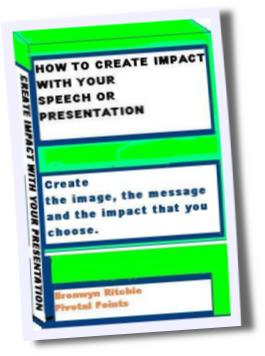Follow these simple tricks to instantly improve the clarity of your speech.
1) Slow Down
It is common sense, really; the faster you speak, the harder it is for your listener to understand. The easiest way to instantly increase the clarity of your speech is to simply slow down.
2) Pause
Pauses are effective little tools that can be employed in a number of situations. Use them to clearly separate sentences and when changing topics.
3) Speak Up
If you want to say something, really say it! Stand up straight, take a deep breath and speak on the exhale. Don't cover your mouth with your hands, a book or your notes. Make eye contact with your listeners and speak directly to them, not down to the floor or to your slides.
4) Articulate Word Endings
In our haste to get our messages out, we often times fail to enunciate word endings - the grammatical markers at the ends of words, such as the plural 's' or past tense 'ed.' If you don't articulate these sounds, it sounds like you're making very basic grammatical errors.
5) Use Clear Consonants
Here are a few examples of commonly confused consonant sounds: /b/ & /p/, /d/ & /t/, /g/ & /k/, /v/ & /f/. The first sound in each pair is voiced, whereas the second sound is voiceless.
Place your hand in front of your
mouth while you say these pairs out
loud:
gate/Kate
girl/curl
game/came
If you are articulating the /g/ and /k/ sounds correctly, you should feel an explosion of air when you make the /k/ sound.
6) Use Consistent Word Stress
To a native English speaker, a certain word stress is considered appropriate or inappropriate depending on where the person is from.
"Inappropriate" word stress can really rub listeners the wrong way because it deviates from their norm and indicates that the speaker is an "other" - an outsider. This can be quite FRUStrating (US)/frusTRATing (UK) for the non-native speaker who is just trying to get his point across.
"So which variety is correct?" I always recommend sticking to the form you are most comfortable with. Try to be consistent with whichever variety suits you best.
7. Speak Simply
Never use a long word where a short one will do. This is a common rule most people have heard, but unfortunately very few put it into practice. Your main goal in every spoken interaction should be to have your message understood. Do this by simplifying your vocabulary and using common English words.
|
Heather Hansen, founder of
Singapore-based Hansen
Speech & Language Training,
is an executive speech and
language coach, writer and
trainer. If you want to
boost your linguistic
abilities and become a
powerful speaker, visit her
website
http://www.hansenslt.com
now for free information on
how to speak clearly,
correctly and confidently!
Join her mailing list to
receive your free special
report, Speak Clearly!
and as a special bonus
you’ll also receive her
monthly newsletter,
Speak
like a Star!
|



